More than a dozen doctors and researchers from the Morgan Adams Foundation Pediatric Brain Tumor Research Program were invited to present their work at the largest global conference in pediatric neuro-oncology.
The 20th International Symposium on Pediatric Neuro-Oncology was held June 13-15 in Hamburg, Germany. ISPNO is the major global meeting for the international community of professionals involved in the scientific research, diagnosis, treatment, and rehabilitation of kids and teens with brain and central nervous system cancers.
ISPNO is a unique meeting that brings together leading researchers, physicians, surgeons, nurses, social workers, parents, and nonprofit organizations every two years to present their work and results and collaborate to help kids with cancer.
According to Nick Foreman, MD, “The Symposium is critically important for researchers around the world. It provides a forum for the thoughtful exchange of information and many opportunities to further collaborative efforts, both of which will lead to more promising studies that we can use to help our patients.” Dr. Foreman started building the neuro-oncology program at Children’s Hospital Colorado in 1995 and has treated countless kids, teens, and young adults with cancer.
Being selected to present at ISPNO is a great honor and recognition of the most innovative and promising research being done to help improve quality of life and survival rates for kids with cancer.
This year, doctors and researchers from the Morgan Adams Foundation Pediatric Brain Tumor Research Program had 39 abstracts selected for presentation at ISPNO 2022, among the most of any research group in the world. Of those, 11 were chosen for coveted and highly respected oral presentations during the three-day gathering.
Here’s a quick look at the leading-edge projects that earned platform presentations at ISPNO 2022 last week:
Development of humanized immune system, posterior fossa A ependymoma patient-derived xenograft model
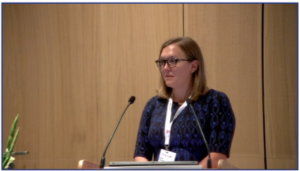
Senior researcher Andrea Griesinger presented the Foreman Lab’s efforts to develop a new xenograft model that will allow for evaluation of the interaction between pediatric brain tumors and the immune system. Dr. Foreman’s team is developing an in vivo humanized immune mouse model and has successfully grown two ependymoma patient-derived lines.
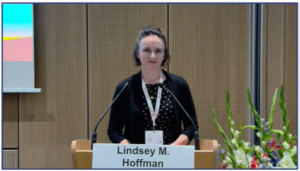
Pediatric Brain Tumor Consortium (PBTC)-055: A phase I study of trametinib and hydroxychloroquine (HCQ) for BRAF-fusion or Neurofibromatosis type-1 (NF1)-associated pediatric gliomas
Lindsey Hoffman, MD presented the results of a Phase I clinical trial treating kids with two specific types of gliomas using two drugs. This clinical trial was initiated from MAF-funded research by Dr. Jean Mulcahy-Levy investigating how cancer uses autophagy to resist treatment. The trial has moved into Phase 2 and will continue with Dr. Hoffman leading it from Phoenix Children’s Hospital.
Chemokine receptor blockade reverses CCL2 mediated immunosuppression and restores CAR-T cell function in posterior fossa ependymoma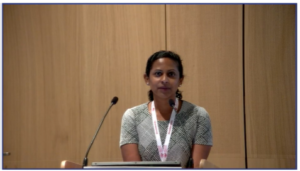
Anandani Nellan, MD, MPH presented her work on a CAR-T cell treatment for ependymoma that she started at Children’s Hospital Colorado and is now continuing at the National Cancer Institute. This project is increasing knowledge of how this pediatric brain tumor suppresses the immune system, which will lead to better immunotherapy treatments.
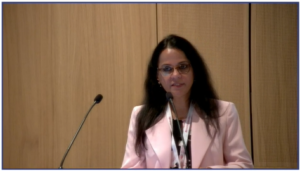 Development and application of a novel antibody against CD99 as a therapeutic strategy in Diffuse Midline Glioma
Development and application of a novel antibody against CD99 as a therapeutic strategy in Diffuse Midline Glioma
Sujatha Venkataraman, PhD presented about her work to create a novel antibody targeting CD99 in diffuse midline gliomas (also known as DIPG), a type of cancer that has an overall survival rate less than 1%.
Survivorship: Education, Clinical Guidelines, and Transition to Adult Care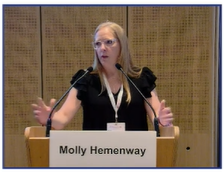
Molly Hemenway, DNP, MS, RN presented the findings of a survivorship study completed at Children’s Hospital Colorado to help pediatric cancer survivors transition to adult care. As treatments improve for kids with cancer, there are more survivors who require long-term follow-up care, and both patients and clinicians need guidelines and support.
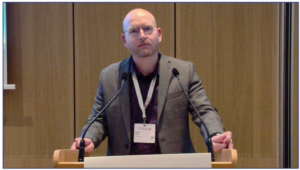 Rapid PTEFb-dependent transcriptional reorganization underpins the glioma adaptive response to radiotherapy
Rapid PTEFb-dependent transcriptional reorganization underpins the glioma adaptive response to radiotherapy
Nathan Dahl, MD spoke about how glioma cells respond to damage caused by radiation therapy and the ways in which a combination treatment targeting CDK9 can overcome cancer cells’ adaptation.
Metabolism mediated radiation resistance inMYC-driven Medulloblastoma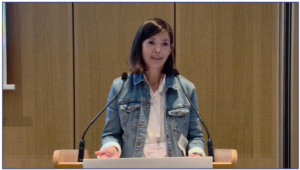
Bethany Veo, PhD described how a subset of medulloblastoma tumors develop resistance to radiation therapy and a potential treatment that prevents the process from occurring.
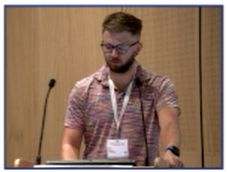 Transcriptome characterization of pediatric adamantinomatous craniopharyngioma at the cellular level
Transcriptome characterization of pediatric adamantinomatous craniopharyngioma at the cellular level
Senior researcher Eric Prince spoke about a project that has described the transcriptome of adamantinomatous craniopharyngioma (ACP) for the first time. This work identified two distinct subpopulations of cells and will help identify possible treatments for this destructive brain tumor.
Tumor associated myeloid cells drive the immunobiology of high risk pediatric ependymoma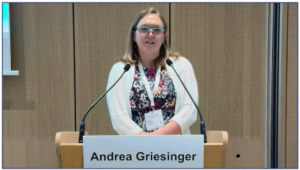
Andrea Griesinger presented an updated working model of the immunobiology of posterior fossa ependymoma and showed how a specific subset of cells has an effect on these deadly tumors.
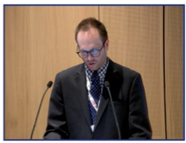 Transcriptomic resolution of subgroup-specific medulloblastoma architecture
Transcriptomic resolution of subgroup-specific medulloblastoma architecture
Nicholas Willard, DO spoke about efforts to understand the heterogeneity of medulloblastoma tumor cells. The group confirmed subgroups of cells identified with single-cell RNA sequencing using spatial transcriptomics, a brand new technique of exploring the physical geography of cells within a tumor. This advanced knowledge of medulloblastoma will help improve treatment options for kids.
Spatial transcriptomic analysis of ependymoma implicates unresolved wound healing as a driver of tumor progression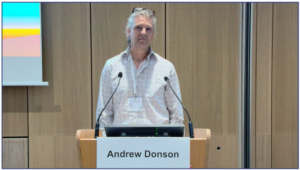
Senior researcher Andy Donson presented groundbreaking results of spatial transcriptomics analysis of ependymoma that identified three major subpopulations of immune cells that play a role in the progression of the tumor. During the Q&A session following the presentation, a conference attendee commented, “That is some of the coolest data I’ve ever seen!”
Throughout the conference, work from the Morgan Adams Foundation Pediatric Brain Tumor Research was recognized as innovative and impactful in the search for safer and more effective pediatric neuro-oncology treatments.
On the final day of ISPNO, Andrea Griesinger received the Pediatric Cancer Research Award for the highest-ranked abstract in the immunotherapy field. While accepting her award, Griesinger explained that the goal of the project is to improve outcomes for kids with ependymoma, a type of cancer that often recurs and is very difficult to cure.
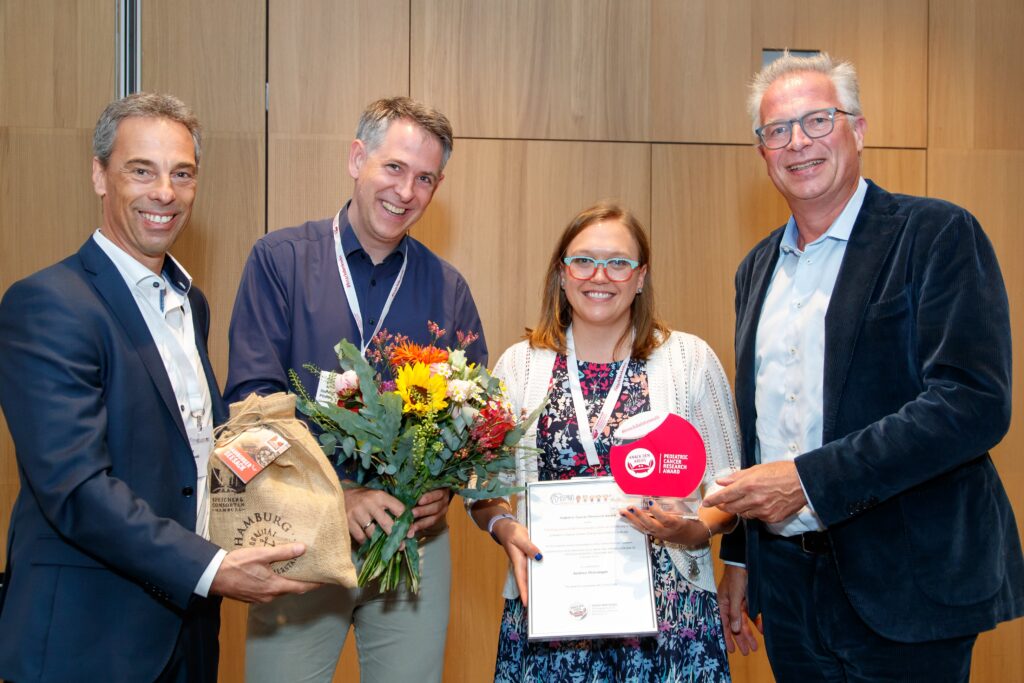
Colorado is home to some of the very brightest individuals who are working every day to help kids, teens, and young adults with cancer.
To see a complete list of the abstracts presented by members of the Morgan Adams Foundation Pediatric Brain Tumor Research Program at ISPNO 2022, please click here.

